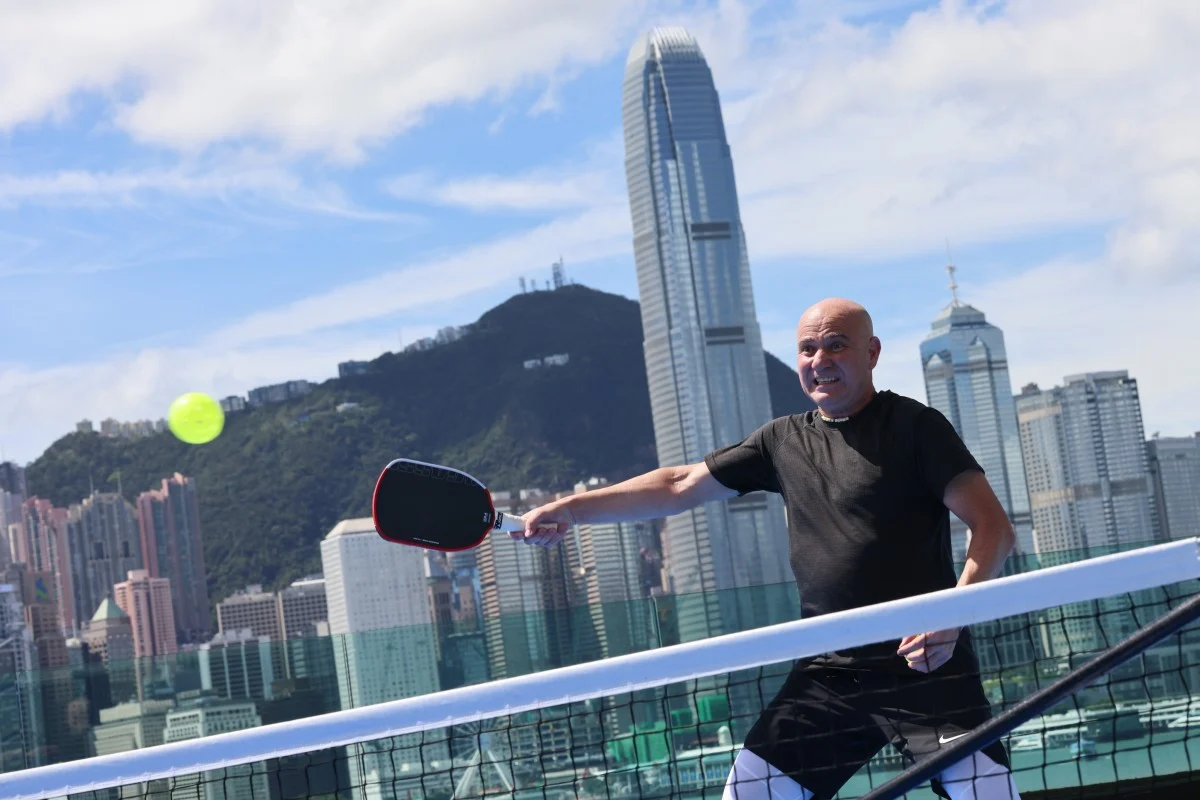Photo Credits to: South China Morning Post
Eight-time Grand Slam champion Andre Agassi says Hong Kong is primed to become a regional hub for pickleball and indicated he’s ready to play a hands-on role in the city’s next phase of growth.
Agassi, who has emerged as one of pickleball’s most prominent evangelists—making his pro debut at 55, investing in the sport and even designing equipment—argues that Hong Kong’s strengths map neatly to what pickleball needs.
“With the infrastructure that exists in Hong Kong, the land and space that exists, the little demand that pickleball takes, as opposed to say tennis, the ability to expand in pickle is pretty exceptional here,” he said during an interview at the Regent Hong Kong. “I would love to see this marketplace open up to the growth of pickleball and the expansion of it. If it’s anywhere near what we’ve seen in the United States, it’ll be pretty epic.”
Agassi is in the city for the first time since 1999, when he defeated Boris Becker in the Salem Open final—their last meeting on tour. This week he attended the Prudential NextGen Aces showcase and found a local scene that, by his account, looks ready to scale.
Hong Kong’s Investment and Expansion
Widely described as a mash-up of tennis and table tennis, pickleball has surged at the grassroots level worldwide and is projected to surpass 20 million players globally by next year. Hong Kong is capturing a slice of that momentum: earlier this month, LIT Sports Global—the investment arm of TGG Holdings—signed three Hong Kong athletes to professional contracts. The group also acquired TLP Pickleball Club of Hong Kong with plans to convert it into the city’s first professional pickleball team.
For Agassi, those moves matter because they anchor participation with visible pathways. “The Hong Kong, China Tennis Association investing so heavily in racquet sports is a big deal to me,” he said. “Tennis is such a high point of entry; unless you really start at a young age, it’s pretty difficult and intimidating to learn. But pickle is quite the opposite. I think it’s meant for mass participation, and people aren’t intimidated to play, and they get better very quickly.”

Photo Credits to: South China Morning Post
Community-Driven Growth
While U.S. investors have poured money into professional leagues and TV packages, Agassi cautions that pickleball’s true engine is community play, not media rights. “My belief is in the participation side,” he said. “I don’t know if pickleball will ever translate on TV. That’s the billion-dollar question. Regardless of TV or turning professional, all you need to do is play it.”
He added that the sport’s appeal is its ability to bring people together across ages and abilities. “It bridges generational gaps from parents to children and, in some cases, grandparents,” he said, noting that his own family grew closer during the pandemic thanks to the game.
Why Hong Kong?
Agassi’s assessment of Hong Kong hinges on practicalities. Courts are compact and relatively inexpensive to convert or build; the sport’s learning curve is gentle; and facilities can be woven into existing multi-use venues. In a city where space is at a premium, those factors are decisive.
The former world No. 1 also hinted at plans that go beyond cheerleading. “I’m working with different possibilities on spreading the facility side of pickleball, as well as a public company I hold that will be able to help those who are fighting out this space in the sandbox, have a vehicle to either exit, expand or create some distribution for their investors.”
Agassi’s Hong Kong Return
Agassi’s return carries a touch of nostalgia—his last visit ended with silverware—but the mission this time is different. He’s part ambassador, part builder, arguing that Hong Kong can tap into the same forces that made pickleball explode in the United States: accessible courts, community leagues, and a pipeline from casual play to organized teams.
If LIT Sports Global’s bets pay off and local bodies continue to prioritize racquet sports, the city could move quickly from curiosity to contender. For Agassi, that trajectory would be the point. “I’ve been to India with intentions of helping the sport grow and expand,” he said. “And certainly… the ability to expand in pickle is pretty exceptional here.”
Whether or not pickleball finds a mass broadcast audience, Agassi’s message to Hong Kong is clear: start playing, build places to play, and let participation do the rest.
























